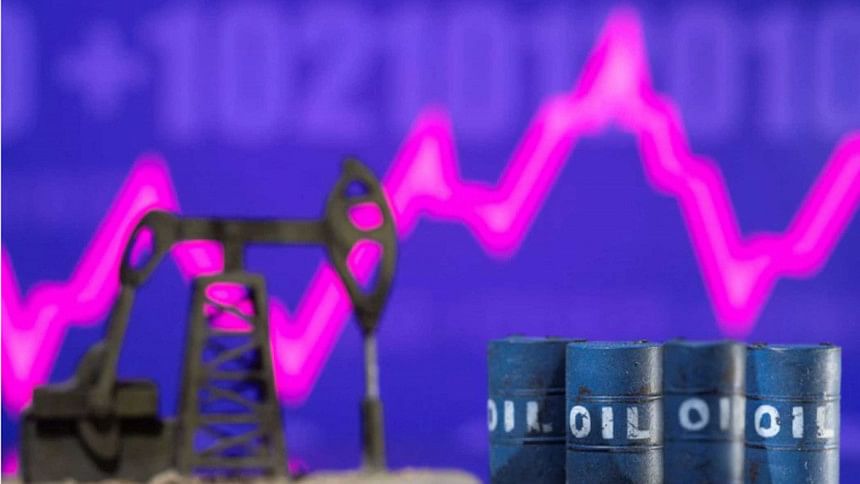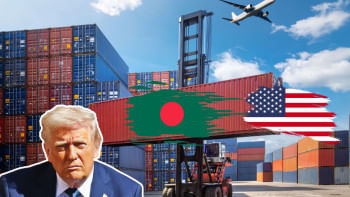How war and heightened inflationary expectations could lead to recession

Writing about inflation and monetary policy when a major war is going on in Europe can appear very cynical, and can be likened to the situation where Nero played the fiddle while Rome was burning. However, we have to fight inflation as we concurrently douse the flames of war. Also, we can't talk about economics without factoring in the ramifications of the Russia-Ukraine war, even if there is a cessation of hostilities soon. Inflationary expectations have changed and supply chains have been totally disrupted, leading to the fear of a global economic slowdown, dubbed the "Putin Recession."
It is my view that combating inflation by simply raising the interest rate during a war—and renewed pandemic-induced lockdowns in China—presents major difficulties for central bankers. First of all, we cannot predict the course of the war, and therefore, the prices of essential items. This includes petroleum, coal and LNG, commodities that are exported by Russia and Ukraine, food items, and precious metals needed for electronic equipment. Secondly, inflation during a war is not a fixed target, but a moving one. The prices of many commodities have already jumped significantly since the war started. Thirdly, central banks need to take into account future price expectations in their models and calculations to determine how much to raise interest and how fast. With changed expectations, all central bankers are back at the drawing board as they try to figure out how to intervene and when.
Economist John B. Taylor of Stanford University recommends that interest rates rise one-and-a-half times as much as inflation. So, if inflation rises from two percent to five percent, interest rates should rise by 4.5 percentage points. "Add a baseline of two percent for the inflation target and 1 percent for the long-run real rate of interest, and the rule recommends a central-bank rate of 7.5 percent. If inflation accelerates further before central banks act, reining it in could require the 15 percent interest rates of the early 1980s," according to another economist, Stanford University's John Cochrane.
Worries are mounting that inflation could possibly get out of control if the war persists much longer. Many multinational companies find themselves in a very difficult state of affairs. Sanctions against Russia's financial system have crippled the international payments infrastructure. In other words, the task of fighting inflation has been confounded partly because commerce and international trade have now become difficult undertakings—hostilities and sanctions have already disrupted financial transactions and global shipping networks.
In my last column on March 6, 2022, I posed a question: Can rising interest rates really tame inflation? This was not just a rhetorical hyperbole since it is my belief that higher interest rates will not be sufficient to knock out inflation. The factors that have contributed to recent inflation are many. It is doubtful whether a higher rate of interest is a precision tool that can bring down aggregate demand sufficiently to tame the price level of goods and services across the economy. Here, I am talking about oil, commodities, rent, cost of labour, and thousands of other items of everyday usage. In Bangladesh, we have seen the impact as soybean oil, pulses, chickpeas and sugar prices have gone out of reach for the average consumer.
Two additional impediments to effective monetary policy in the post-war landscape are "price expectations" and "heightened uncertainty." The New York Fed's just-released Survey of Consumer Expectations reports that consumers expect higher rates of inflation even three years from now. The head of the US Fed Jerome Powell speaks for all when he says that the economic path ahead remains unsettled given Russia's invasion of Ukraine. He then adds, "We are going to avoid adding uncertainty to what is already an extraordinarily challenging and uncertain moment.'' How does a central bank avoid accelerating uncertainty when it has to be flexible and reverse its course in light of revised data and real-time adjustments?
Given the fog of war, it is hard to gauge what the economic effect of the rising interest rate will be. "Those kinds of estimates always have a confidence interval around them," said Jerome Bernstein, a member of the White House Council of Economic Advisers. "I would argue that confidence interval is probably wider in periods of greater uncertainty," he added.
In an environment of heightened uncertainty and elevated price expectations in the market, I can see clearly that raising the rate of interest to fight inflation could be ineffective and entail collateral damage. Typically, central banks manipulate aggregate demand by using the three main tools at their disposal: the bank rate, reserve ratios, and open-market operations (OMO). Raising the rate of interest is already being severely criticised by economists. "Without decreasing the budget deficit, combating inflation with monetary policy is like entering a heavyweight championship competition with one hand tied behind your back," according to Nobel Prize-winning economist Thomas Sargent.
Many economists have identified controlling the money supply through OMO as a vital instrument in regulating inflation. Central banks flooded the market during the economic slowdown in 2020 by buying government bonds and other financial instruments. Once the economies bounced back, semiconductor chip shortages, supply chain bottlenecks and higher energy prices in Europe led to strong inflationary tendencies.
To add to the problem, the longer inflation remains above the target—or continues to rise and the planned interest rate hikes are ineffective in tamping it down—the greater the risk that households and businesses will grow accustomed to prices rising rapidly, opening the way for a self-reinforcing series of higher salary increases and price increases by employers to cover their increased costs. These increased expectations could lead to a wage-price spiral.
Another challenge to consider is, if the interest rates skyrocket and stay there, debt repayments may become unmanageable for governments. Inflation might stay high because of factors outside the domain of central banks, as exemplified by the Russian invasion of Ukraine, which has already roiled the energy market. Shipping delays complicated by pandemic-driven lockdowns in Asia and wage-price spirals could also keep inflation raging well into 2024. If the conflict in Europe engulfs the rest of the world, a combination of higher fuel costs and wavering consumer sentiment could be a drag on economic growth, raising the spectre of a "Putin Recession," or even stagflation.
Dr Abdullah Shibli works for the information technology company, Change Healthcare, Inc. and is senior research fellow at the US-based International Sustainable Development Institute (ISDI).
Dr Abdullah Shibli works for the information technology company, Change Healthcare, Inc. and is senior research fellow at the US-based International Sustainable Development Institute (ISDI).

 For all latest news, follow The Daily Star's Google News channel.
For all latest news, follow The Daily Star's Google News channel. 



Comments